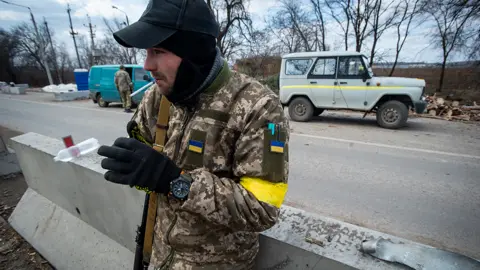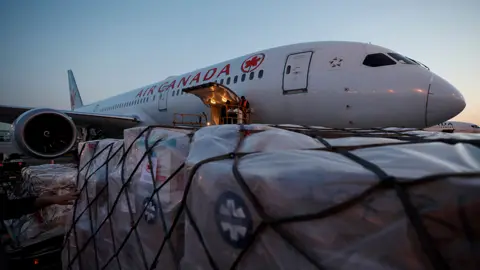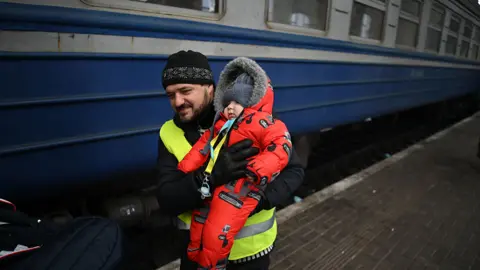Will Nato get involved if dirty bombs are used in Ukraine? And other questions
 Getty Images
Getty ImagesConcerns have been raised that President Putin may use non-conventional weapons in Ukraine, such as chemical weapons or so-called dirty bombs.
Members of the BBC audience have been sending in their questions about the impact this would have, as well as the many other aspects of the war.
Answering them are:
- The BBC's chief international correspondent Lyse Doucet in Kyiv, Ukraine's capital
- Europe correspondent Jenny Hill in the Russian capital, Moscow
Will the potential for a Nato engagement increase if dirty bombs or chemical weapons are used? - Gordon Mains, Glasgow
Lyse Doucet writes:
This question must be on the minds of Nato members. But they are very careful and cautious about not being drawn into this war beyond the supply of military weapons and ammunition.
Nato's principle of "collective defence," enshrined in its Article Five, is "an attack against one ally is considered as an attack against all allies". It is now trying to defend "every inch" of Nato territory but there's a laser focus on any threats which cross the border.
They know this threat exists - although Russia says it has no plans to invade other countries.
Why can't we fly in humanitarian aid to besieged cities? - Steve Harvey, Northamptonshire
Lyse Doucet writes:
Ukraine does not control its airspace. Many airports have come under attack by Russian forces, on the ground and from the air. In most parts of the country, it would be too dangerous to fly in the desperately needed supplies.
As you've no doubt seen, a lot of aid is coming in by road across Ukraine's western borders. Western cities like Lviv, still relatively untouched by direct Russian strikes, have become a hub for humanitarian aid.
All the countries bordering Ukraine to the west have also quickly ramped up a major emergency operation as the numbers spiral in ways not seen since World War Two.
In any war or disaster, it is always a question of resources and access. Right now, aid trucks laden with urgent supplies are being turned back by incessant Russian shelling.
Russian state media also show images of Russian aid distribution in areas under their control.
 Getty Images
Getty ImagesHow likely is it that the war in Ukraine could escalate into a full-fledged war between Russia and Nato? - Connor, Northern Ireland
Jenny Hill writes:
It's not impossible, which is why Nato has been so wary of intervention.
Vladimir Putin has threatened any country which hinders his "special military operation" in Ukraine with consequences of a severity "not experienced in your history", which most take to mean the use of nuclear weapons.
It's difficult to know how seriously to take Mr Putin's rhetoric but, given his recent unpredictability, many in the West are nervous about where this could all go.
Mr Putin insists that he's only in Ukraine to protect the Russian speaking populations of Eastern Ukraine from what he deems to be the aggression of the government in Kyiv. But none of us can say for sure what his game plan really is.
He's said he doesn't want to "occupy" Ukraine - but then he also he said he wouldn't invade it. More broadly, we know from what he's written and said, that he sees Nato as a huge threat to Russia and that he wants to challenge its structure, particularly in Eastern Europe.
Nato would have to react in the event of an attack on the countries which have joined since 1997 - the countries which border Ukraine and Belarus.
The further west that Russian forces advance, the greater the risk of a accidental - or deliberate - strike on Nato territory.
Why has the UK not expelled all the Russian diplomats and staff in London? - Julie Thompson, Preston
Jenny Hill writes:
My guess is that while there's still a hope (however fleeting) that diplomacy could end this, the UK and other Western countries will resist what would be viewed in Moscow as a provocation.
It would also likely result in the expulsion of their own embassy staff from Russia.
After seeing all the trains fully packed, why aren't more being sent in to rescue the fleeing people? - Kate Russell, Glasgow
Lyse Doucet writes:
The trains are running, many on time, even in this war. But in some places, including Irpin just west of Kyiv, the tracks were attacked so that station is now not in use.
I noticed on my last trip to the wonderful 19th Century train station in Kyiv that the platforms for trains heading west were not as crowded, although the trains pulling out are certainly still full.
 Getty Images
Getty ImagesWhat's the motive behind the Russian invasion in Ukraine? - Karen Keven, Nigeria
Jenny Hill writes:
The truth is we don't really know for sure.
Vladimir Putin claims that he's coming to the rescue of Russian speaking populations of Eastern Ukraine who are victims of "genocide" (of which there's no evidence) by the government in Kyiv.
He's demanding that Ukraine officially hand over some territory in the east, including Crimea which he annexed in 2014, to Russia. He also wants Ukraine to give up on its ambition to join Nato.
Does he have wider ambitions? Perhaps. We know he views Nato (and in particular the former Soviet countries that joined after 1997) as a threat to Russian security.
Moscow has demanded changes to Nato structure - it wants, for example, European countries like Germany, which host US nuclear weapons, to return them to America.
There are analysts who say we also can't rule out the possibility that Mr Putin's nurturing an ambition to re-build the Soviet Union - given how its break-up appears to be a continuing and humiliating source of deep regret for him.
Is it possible for the United Nations to send troops into Ukraine and also enforce a no-fly zone? If so, why have they not made any attempt? - Joseph Akinwunmi, Lagos
Lyse Doucet writes:
The United Nations would have to be asked and authorised to come in, usually by the UN Security Council. But at the moment this war is raging and, in some comments, Russia even denies it has invaded its neighbour. It still calls this a "special military operation" to defend Russia from threats.
Ukraine has repeatedly called for a no-fly zone. It has been repeatedly ruled out.
Western/Nato powers know this would draw them into direct conflict with Russia.
A no-fly zone would not just involve targeting Russian warplanes, it would also require attacks on Russian assets on the ground.
If Russia takes control of the whole of Ukraine, what would the response be from Nato and the US? - Jeff Moono, Lusaka
Jenny Hill writes:
That's the nightmare scenario for Nato, which has bolstered troop numbers in neighbouring countries but which, for the reasons outlined above, does not want to be drawn into a war with Russia.
There's speculation that, before that eventuality arose, Kyiv might be persuaded to do a deal with Moscow - in other words, hand over some of its territory in return for a cessation of hostilities.
However, the problem with that scenario is, firstly, that Kyiv doesn't want to give ground, and secondly, there's also a fear that such an outcome might embolden Mr Putin.
Nevertheless, right now most analysts assume that Russia would struggle to hold Ukraine in the long term.
As the fighting continues and more people and soldiers will suffer horrific injuries from the bombing, will they have enough blood supplies. Should people be donating their blood? - Linda Potter
Lyse Doucet writes:
I remember when this invasion started more than two weeks ago that a call went out for blood donations.
Ukrainians are signing up to fight, and to donate blood - wherever and whenever they can. But, like you, you they must be asking if they have enough.
When do all of the sanctions go into effect? - Alfred Pons, Albuquerque, US
Jenny Hill writes:
Many have already taken effect but others are pending.
The UK has just announced sanctions on 386 members of the Duma, the lower house of the Russian parliament, who support the invasion of Ukraine.
And the EU says it remains ready to impose more sanctions.
Can you tell us what Belarus is doing in this conflict? Is any of their army actually taking part? - Steve Simmons-Jacobs, Romsey
Lyse Doucet writes:
Neighbouring Belarus became a staging ground for Russian troops and heavy weaponry in the weeks leading up the invasion (even though it was described as military exercises). It then became a launching pad for Russia to move into Ukraine, and for Russian missile strikes across the border.
So far, the US says it sees no evidence that Belarussian forces have become directly involved.
Belarus has also hosted talks between Russian and Ukrainian negotiating teams close to the border.
In 2020, Russian forces helped the Belarussian leader, Alexander Lukashenko, survive an unprecedented uprising against his rule. Russian President Vladimir Putin expects him to return the favour.
However, although it was announced before the invasion that Belarus could join the fight, Lukanshenko recently said he wouldn't.
The Ukrainian president, Volodymyr Zelensky, also made a direct appeal to Belarus last month, saying "Be Belarus, not Russia."

Russia attacks Ukraine: More coverage
- LIVE: Latest updates from on the ground
- THE BASICS: Why is Putin invading Ukraine?
- MAPS: Tracking Russia's invasion
- IN DEPTH: Full coverage of the war

